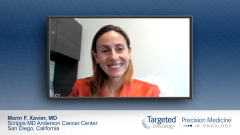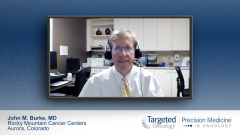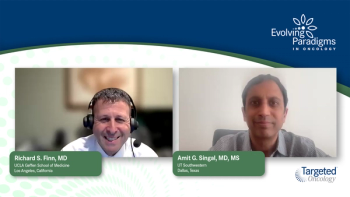
Anti-CD19 Therapy for DLBCL: Treatment Selection
Variables that are likely to impact the use of loncastuximab vs a combination approach with tafasitamab and lenalidomide to treat relapsed/refractory diffuse large B-cell lymphoma.
Episodes in this series

Marin F. Xavier, MD: The duration of response that we see is about 10.3 months, and the time to response was 1.3 months. In the past, 10.3 months was excellent. It still is, but it seems that perhaps the tafasitamab may be a little longer for those responders. Any comments on that? I know those were no head-to-head comparisons, but that’s my impression.
John M. Burke, MD: I interpret that with caution because sometimes those median durations of response change with longer follow-up, so it’s possible that will happen. It did already change once from 10 to 13 months if I’m not mistaken. Another comment is that it stops after a year. As you pointed out earlier, tafasitamab is a continuous therapy. We don’t know, but maybe an important feature of tafasitamab is that it continues on. Maybe there’s some benefit to that. My understanding is that there may be some studies of duration of tafasitamab in the future, even just retrospective ones. We don’t know the right answer in terms of, do you need to keep the tafasitamab going for those long responders?
Marin F. Xavier, MD: That’s an excellent point. The LOTIS trial was fixed duration, John?
John M. Burke, MD: Yeah, up to 1 year of therapy.
Marin F. Xavier, MD: That’s an important point. Of course if you have somebody who’s responding to therapy, I could imagine them not wanting to stop as we see sometimes in our patients with CLL [chronic lymphocytic leukemia].
I’m correct, the PBD-dimer is an alkylating agent. It binds to the DNA minor groove and forms highly cytotoxic DNA interstrand crosslinks. I still don’t know how that relates to the edema. That’s unique. In general, most of the toxicities were fairly low grade. I’m excited to use this drug. I did a cost analysis, and it’s pretty much on par with tafasitamab-lenalidomide, so they must have strategically priced it like that. A lot of our Medicare beneficiaries or a lot of our patients don’t have access to orals, so I can see this having a place for some people who have really high co-pays or access issues for the lenalidomide.
John M. Burke, MD: Yeah. Another comment about duration of response that you’ve got to interpret with caution is that it’s not the same patient population in this study as in tafasitamab-lenalidomide, right? Because this study required at least 2 prior lines of therapy. This is only third line and beyond, whereas tafasitamab-lenalidomide included second line and beyond. We saw from subset analysis of L-MIND that tafasitamab-lenalidomide works better and longer in the second-line setting than in the third-line setting. If you start weighting PFS [progression-free survival] curves and duration-of-response curves with those second-line patients, it’s going to make your drug look better.
Marin F. Xavier, MD: That’s why it’s also not like apples to apples because we’re talking about a second- and third-line approval.They’re going to be competing because they’re in a similar space, but upon relapse an unfit patient would not go straight into loncastuximab. They’d have to be third line to stay on label. We don’t know a lot about if they progressed on the tafasitamab-lenalidomide, if that’s going to be an effective strategy to have a targeted antibody-drug conjugate with a payload that’s different from that immunomodulatory mechanism that the tafasitamab-lenalidomide has. I don’t know if, once we get bispecifics, if that’s going to kick it all out of the ballpark for both of those. But this is going to be great especially for our less fit patients or our patients who do relapse post salvage and autotransplant.
Transcript edited for clarity.







































